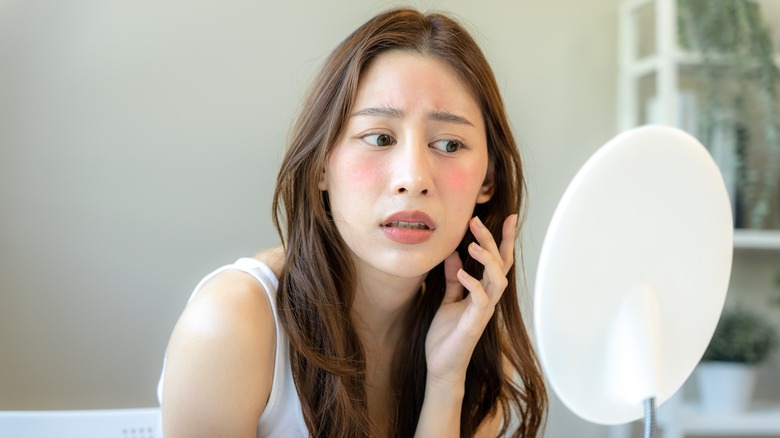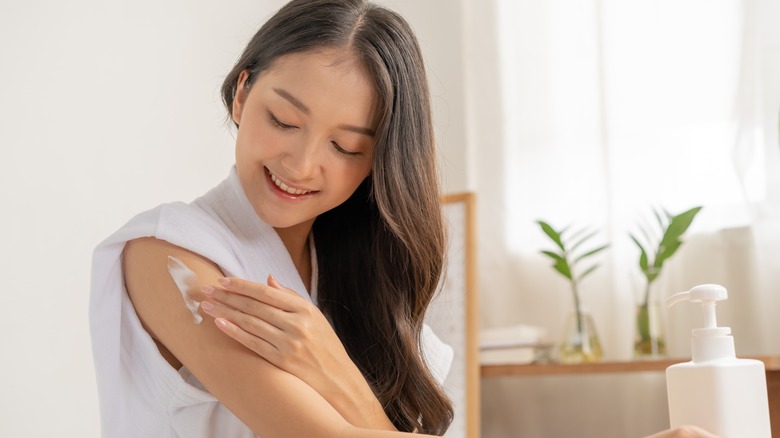A Surprising Sign Your Period Might Be Around The Corner
Are you tired of feeling uncomfortable or downright miserable before your period arrives each month? You're not alone! Many women experience physical and emotional symptoms as their menstrual cycle approaches, including pelvic pain, bloating, mood swings, and sugar cravings. Some also get headaches and pimples, feel hungry around the clock, or have difficulty sleeping.
Things are even worse for those with premenstrual syndrome (PMS), which causes debilitating symptoms in about 5% of cases, according to a 2015 review published in the BMJ Clinical Evidence journal. PMS is often responsible for depression, anxiety, insomnia, water retention, and temper outbursts. These symptoms tend to get worse after age 30 or 40 and can exacerbate existing health problems, such as asthma or migraines, notes the Office on Women's Health.
However, that time of the month is different for each woman and can manifest itself in unexpected ways. You may not experience cramps or weight gain, but you could have other symptoms that seem unrelated to your period. If you spot them early, you might be able to mitigate their impact.
Watch out for this symptom in the days preceding your period
As you probably know, your body goes through many changes during menstruation. These changes are largely due to the fluctuating levels of estrogen, progesterone, and other hormones. What you may not know is that the same hormones that regulate your period can also cause skin problems, according to Melissa Piliang and other dermatologists interviewed by Allure. Your skin may become oily or sensitive and prone to irritation, and your hair may suddenly become greasy.
A 2017 survey in the European Journal of Dermatology found that more than 40% of premenopausal women experienced increased skin sensitivity before and during their periods. This symptom was also observed in about one-third of peri- and postmenopausal women. Most respondents said they got dry skin, redness, pimples, and other skin problems during that time of the mouth.
"When estrogen is low, your skin is a bit more sensitive and dry because estrogen is a good plumper of collagen and hydrates the skin," explains dermatologist Shyamalar Gunatheesan (via Mamamia). Additionally, some women experience acne flare-ups caused by inflammation, which may further increase skin sensitivity. "If you're getting a consistent flare, just be aware of that vulnerable period. Little things like being extra vigilant with removing your makeup can help," says Gunatheesan.
Take these steps to keep your skin healthy and glowing
"Period skin" is a real thing, and there's not much you can do to prevent it. However, you may be able to ease its symptoms by making small changes to your diet and beauty routine. Mary Jane Minkin, a gynecologist at Yale School of Medicine, recommends taking birth control pills to balance your hormones. Those containing either drospirenone or norgestimate and ethinyl estradiol, such as Yaz and Ortho-Cyclen, are the most effective for skin issues, she said in an interview with Allure. Another option is Demulen, an older formula based on ethynodiol and ethinyl estradiol.
The problem is that hormonal contraceptives carry potential side effects ranging from blood clots to liver damage. For example, it may be wise to stop taking birth control if you experience anxiety, mood swings, depression, or low libido. A safer but not so effective option is to apply a fragrance-free moisturizer, suggests dermatologist Melissa Piliang (via Allure). For best results, use it along with sunscreen and steer clear of exfoliants, retinoids, and other harsh products.
Piliang also recommends cutting back on simple carbs, especially if you have diabetes or polycystic ovary syndrome. Diets high in sugar, carbs, fat, or salt can exacerbate PMS, according to a 2019 study published in the journal Nutrients. Moreover, foods with a high glycemic index (GI), such as cookies and white rice, can throw your hormones out of balance and worsen acne, notes a recent review presented in JAAD International.


